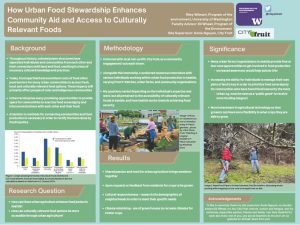Urban Farming and Food Justice: How Urban Food Stewardship Enhances Community Aid and Access to Culturally Relevant Foods
Access to fresh, local, and culturally appropriate food is a right that every individual is entitled to. Urban agriculture poses great potential for bridging the gap between communities facing food insecurity, and locally grown foods that also pertain to the cultural values of all Seattle residents. By examining the impacts that urban farming has on access to quality food, as well as what ways Seattle can implement better food access, we can begin to take action towards reality where food justice and food satisfaction are achieved. This study focused on the perspectives of individuals who are working within urban agriculture in Seattle, and aimed to provide a summary on how Seattle currently is serving its community with its food supply, and how it could be better in the future. In order to learn more about these perspectives, I interviewed individuals via zoom, email, and face-to-face and posed a set of questions in which I recorded and transcribed their responses. All of the respondents were optimistic about Seattle’s ability to enhance food security, and believed that the city leads the way in food justice in many ways, providing a hopeful and exciting outlook for Seattle food justice efforts. The impact of the many urban farms and organizations focusing on food justice has created many avenues of accessibility for many individuals in Seattle by not only providing healthy, local, and relevant food options, but allowing for spaces where people can connect over growing and cultivating food together.
